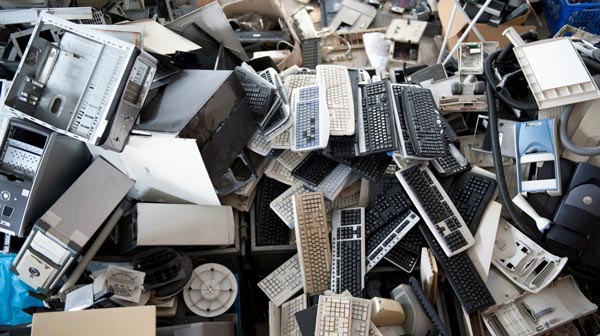Lasting Electronic Devices Disposal: Make Certain Conformity with R2 Certification
Lasting Electronic Devices Disposal: Make Certain Conformity with R2 Certification
Blog Article
Elevate Your E-Waste Management With R2 Certification: a Thorough Review
One trick method to raise e-waste monitoring methods is by obtaining R2 qualification. By checking out the processes and benefits linked with R2 certification, a deeper understanding of exactly how it can transform e-waste administration approaches emerges, dropping light on a course towards sustainability and ethical disposal methods.
Value of E-Waste Management

When e-waste is not managed appropriately, these harmful substances can leak into the ecological community, causing injury to wildlife and possibly entering the food cycle, posturing dangers to human health. In addition, the improper disposal of e-waste adds to pollution and greenhouse gas discharges, intensifying environment change and environmental degradation.

Advantages of R2 Accreditation

Firstly, R2 certification boosts integrity by showcasing an organization's devotion to sustainable methods. It assures clients, companions, and stakeholders that the business complies with rigid standards for e-waste administration - r2 certification. This credibility can lead to enhanced trust fund and enhanced partnerships with clients who focus on ecological responsibility
Second of all, R2 qualification helps alleviate threats related to incorrect e-waste disposal. By adhering to the stringent standards stated by the certification, organizations can decrease the likelihood of data violations, ecological contamination, and lawful effects. This proactive technique safeguards the firm's reputation and reduces prospective responsibilities.
Last but not least, R2 certification demonstrates a dedication to ecological stewardship - r2 certification. By sensibly managing electronic waste through certified processes, organizations contribute to the conservation of resources, decrease of air pollution, and promo of a round economy. This commitment not only profits the environment but also aligns with evolving consumer expectations for sustainable company methods
R2 Accreditation Process Summary
Having developed the advantages of R2 qualification in promoting credibility, risk mitigation, and ecological stewardship, it is necessary to now describe the in-depth process associated with obtaining this qualification. The R2 qualification procedure begins with a comprehensive review of the organization's operational policies and procedures to ensure conformity with the R2 criterion. This preliminary assessment is crucial in recognizing any kind of voids that require to be dealt with before continuing additionally.
Once the company's methods align with the R2 standard demands, an independent third-party auditor conducts an on-site audit to review the application and effectiveness of these techniques. This audit includes a comprehensive evaluation of documentation, meetings with personnel, and physical inspections of centers to confirm my link conformity.
Complying with an effective audit, the organization obtains an accreditation choice based on the auditor's searchings for. If authorized, the company is given R2 certification, demonstrating its dedication to responsible e-waste monitoring. It is essential to keep in mind that maintaining R2 qualification needs recurring compliance with the requirement's needs and regular audits to make certain continued adherence to finest techniques in e-waste recycling and disposal.
Key Standards for R2 Compliance
A necessary aspect of accomplishing R2 conformity is ensuring that all electronic waste (e-waste) handling centers meet strict ecological and safety requirements. To follow R2 requirements, organizations need to abide by key requirements that concentrate on accountable e-waste monitoring practices. These criteria include carrying out a recorded ecological, health, and safety administration system, making certain the secure handling of data-containing gadgets, and carrying out detailed downstream due persistance to track the last destination of e-waste materials.
Furthermore, R2 compliance necessitates the appropriate screening, repair, this post and recycling of digital devices to prolong its beneficial life and decrease ecological influence. Facilities looking for R2 qualification have to additionally focus on employee health and wellness by giving essential training, individual safety devices, and a risk-free working environment. Additionally, keeping thorough documents of e-waste handling activities and consistently undertaking audits by approved accrediting bodies are essential parts of showing continuous compliance with R2 criteria.
Influences of Sustainable E-Waste Practices
The implementation of lasting e-waste techniques in accordance with R2 compliance not only ensures ecological and security standards are fulfilled yet likewise significantly influences the general lifecycle of electronic items. By sticking to R2 requirements, digital waste administration processes become a lot more effective, reducing the ecological footprint of digital products. Lasting e-waste techniques facilitate browse around this web-site the proper disposal of electronic components, guaranteeing that hazardous materials are handled sensibly and do not wind up contaminating the environment.
In addition, sustainable e-waste practices can contribute to task creation in the recycling and repair sectors, promoting economic growth while promoting environmental obligation. Generally, the fostering of lasting e-waste techniques under R2 certification serves as an essential action towards attaining an extra eco lasting electronic devices sector.
Verdict
Finally, implementing proper e-waste monitoring techniques is crucial for ecological sustainability and source preservation. R2 qualification plays a crucial function in making sure accountable handling and disposal of electronic waste. By adhering to the strict requirements set forth by R2 criteria, companies can not just reduce their environmental impact yet additionally add to an extra lasting future for generations to find.
One key method to boost e-waste monitoring methods is by achieving R2 certification. By discovering the processes and benefits associated with R2 qualification, a deeper understanding of how it can change e-waste monitoring methods emerges, losing light on a path in the direction of sustainability and honest disposal techniques.
The R2 qualification process starts with a detailed evaluation of the organization's functional policies and treatments to guarantee compliance with the R2 criterion. If authorized, the company is approved R2 certification, showing its commitment to liable e-waste management. On the whole, the adoption of lasting e-waste techniques under R2 qualification offers as a crucial action towards attaining a more ecologically sustainable electronic devices sector.
Report this page